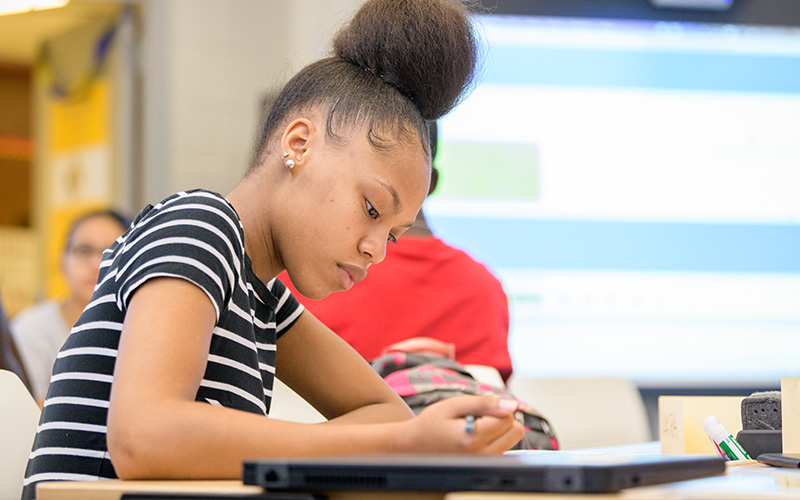Research Spotlight: Erica Litke

To what extent do teaching practices that support students’ learning of algebra manifest in classroom instruction?
Drawing on video from 108 ninth-grade algebra lessons from 5 school districts, a recent study by University of Delaware assistant professor Erica Litke found that teachers engaged in specific instructional features that benefit student learning of algebraic ideas to a modest degree. Ninety-five percent of the lessons included teacher-centered instruction that heavily focused on teaching algebraic procedures. However, in about half of the lessons, teachers engaged to some extent in instruction that supported students in making connections between algebraic representations, such as noting that an algebraic solution connected to a graphical depiction. But, other key practices were enacted less frequently. For example, in 60% of the lessons, teachers did not connect the topic at hand to other concepts in algebra or to the broader domain of mathematics.
Litke discusses this issue in “The nature and quality of algebra instruction: Using a content-focused observation tool as a lens for understanding and improving instructional practice,” published in Cognition and Instruction. The results of this study can guide the field of mathematics education in helping teachers develop and deepen discipline-specific instructional features that show promise for student learning.
Despite the prominence of high school algebra and its function as a gateway to higher-level mathematics courses, there are few large-scale examinations that focus on the features of instruction rather than the format of the lesson. Most studies analyze whether lessons are organized around teacher-led instruction or student exploration of the topic. Few focus on finer-grained, in-the-moment instructional moves that can support students’ learning of algebra, such as helping students make sense of procedures, develop procedural flexibility, leverage connections between abstract algebraic ideas and familiar numerical content, or situate the topic within a broader mathematical context. Litke describes the depth and quality of these features of instruction using scores from a newly developed, algebra-focused observation tool that grounds the description of instructional practice in the course content.
“A content-focused observation tool allows us to consider instruction that supports students’ learning opportunities around that content and has the potential to engage teachers directly in the work of instructional improvement, as it connects directly to the content they are teaching,” said Litke. “By more specifically articulating what these instructional features look like and how they are enacted, we can support teachers in deepening their instruction and potentially bridging to more ambitious practices.”
Litke received the 2021 Early Career Publication Award from the American Educational Research Association (AERA) Special Interest Group for Research in Mathematics Education in recognition of this work.
About Erica Litke
Erica Litke is an assistant professor specializing in mathematics education in the School of Education at the University of Delaware. Her research focuses on understanding and improving instructional quality in mathematics for students in the elementary and secondary grades. She serves as co-PI on a National Science Foundation-funded project, titled Improving Professional Development in Mathematics by Understanding the Mechanisms that Translate Teacher Learning into Student Learning.
STEM Education Faculty at CEHD
Erica Litke’s research complements the work of our mathematics teaching and learning faculty at UD, which include James Hiebert (continuous improvement in mathematics education programs), Charles Hohensee (backwards transfer in student learning), Nancy C. Jordan (number- and fraction-sense interventions), Anne Morris (continuous improvement in mathematics education programs), Teo Paoletti (student understanding of mathematical ideas), and Eric Sisofo (reflective practice among teacher candidates).




